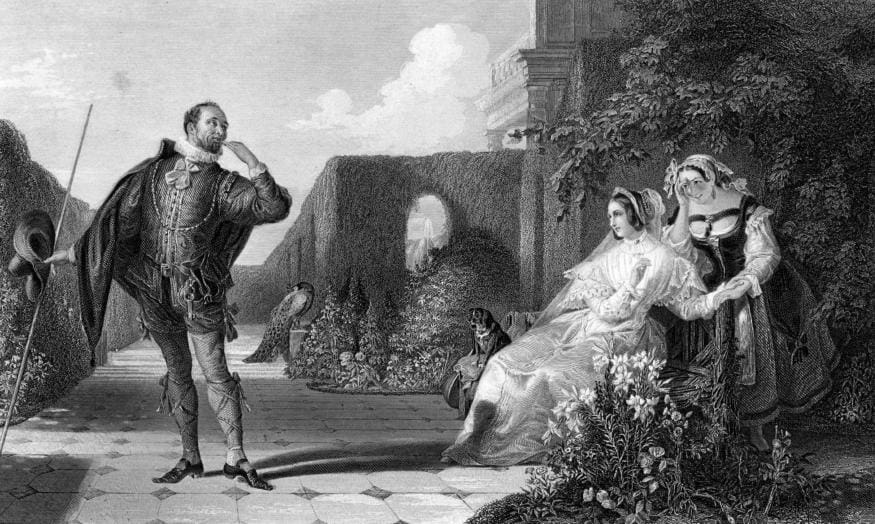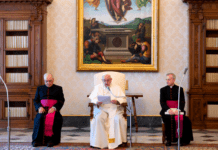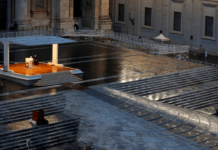Before our epic lock-down began, I was sitting towards the back of a theater audience in Richmond, Virginia, waiting for a performance of Shakespeare’s Twelfth Night to begin. While I consider myself fairly familiar with Shakespeare, I couldn’t quite remember what I was supposed to be seeing as the curtain rose. Nevertheless, I was surprised when two voices commenced singing from the audience rather than the stage.
As they lifted their voices, more characters responded to them from the stage and throughout the theater. They brought out instruments, moved to the music, and greeted each other with joy. It was a party in the truest sense of the world. They were celebrating being together, enjoying being in community with others who truly knew and loved them. Looking back now, after over a month of pandemic solitude, that sort of community seems even more attractive, part of humanity that we are sorely missing.
This choice to emphasize community in the beginning of the play was very intentional on the part of not just director Irene Kukeyendall, but of Catholic dramaturg Alonna Ray. Ray, who served as a consultant throughout the production process, wrote in an essay that helped define the vision of the production, “This communal living is essential in the Christian understanding of identity and healing. The Body of Christ which is made up of each and every Christian is itself a community.”
Whether it is Catholic moms gathering together to pray the rosary via video conferencing, teens reaching out to one another through apps, or extroverts bouncing off the walls longing to be in a crowd, it is clear that community is part of our identity, of who we are at our core as human beings. At the same time, while technology is helpful, it can at times allow us to put up a veneer, masking our authentic selves, and preventing deeper levels of true friendship.
Twelfth Night, like many Shakespeare plays, delves into this concept of identity and how central it is to living a full life. Main characters Viola and Olivia both take on new personas, hiding who they are not only to the world at large, but also from those who love them. Ray explains, “When we cut ourselves off from that community, as Viola and Olivia did in isolating themselves within their self-made identities, we say no to the grace and support that comes with communal living.”
The Richmond Catholic Theater’s interpretation of this play emphasized the timeless lesson that “the truth shall set you free”. Viola, shipwrecked and believing that she had lost her brother at sea, takes on the name Cesario and accepts a position at the court of Duke Orsino. In many ways, she has a good life – wealth, position, and comfort. Yet it becomes clear throughout the play that in disguise Viola cannot really thrive. Indeed, when Olivia becomes besotted with Cesario/Viola, it is apparent that this ruse is not all it’s cracked up to be.
In Ray’s words, “Life lived under false pretenses cannot flourish,..the world around us seems to offer comfort, and the temptation to be wholly self-sufficient is overwhelming in times of crisis, leading many to place their trust in their own abilities rather than the providence of God. However, true freedom subsists in uniting one’s suffering to the cross, in accepting our foundational identities as daughters and sons of Christ, and allowing our growth and direction to take root in Him before we deign to grow upward and outward. Without those roots, we become disconnected from our true identities and unable to have life and live it to the fullest.”
When I attended this production, I had no idea how timely its message would be (though of course, Shakespeare’s canon are classics particularly because they are timeless). We certainly have all been challenged in recent weeks with everything from illness to job loss to isolation. Will we try to forget about the pain and immerse ourselves in distractions and relationships that aren’t fruitful? Or, will this be a pivotal moment in our lives to surrender to God, to unite with Him so that we can more fully unite with others in community?
At the end of Twelfth Night, the characters reveal their true identities; they find the happiness they seek. Family ties are reestablished, new relationships are forged, and vibrant communities are fostered. It is certainly a ray of hope for all of us should we choose to explore our own identity, rooted in Christ during this chaotic time.


















Sara T. Jackson Make 6150 bucks every month… Start doing online computer-based work through our website. I have been working from home for 4 years now and I love it. I don’t have a boss standing over my shoulder and I make my own hours. The tips below are very informative and anyone currently working from home or planning to in the future could use this website…….. Details Here